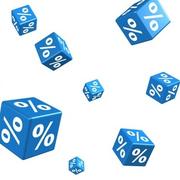An opinion poll sees a party critical of the European Union with a good chance of making it into the German parliament and becoming the power broker in the election on Sunday. If the Alternative für Deutschland (AfD, Alternative for Germany) scores five percent they’re in, and the opinion research institute Insa sees them achieving that with a last-minute gain of one percent. In the German electoral system a party has to score five percent of the votes to move into parliament with the commensurate number of seats, i.e. at least 31 of the 620.
The Insa researchers see the AfD tracking stronger than other pollsters. Allensbach, Emnid, Forsa and Infratest dimap had the Euro sceptics between two and a half and four percent in recent days.
The AfD is fiercely critical of the huge bailouts paid to countries like Greece to keep them afloat. It is attracting support from people who usually vote for all other parties.
Insa’s numbers confirm the view of pollsters that the AfD has the biggest chance of all the splinter parties to get into the Bundestag, the federal house of representatives.
If it does, it could get tight for the present coalition government of conservatives and liberals, headed by Angela Merkel, to continue. Opinion polls see the three government parties winning a wafer-thin majority.
Experts suggest that would make a “grand coalition” of Social Democrats and conservatives likely. Hence the Social Democrats, now the major opposition, would profit from the AfD’s getting into parliament.
"The AfD’s core voter potential lies somewhere around two and a half percent,“ says Klaus-Peter Schöppner, director of the TNS Emnid research institute. These are not just disappointed supporters of Merkel’s Christian Democrats, but of all parties, he says.
The head of the Insa institute, Hermann Binkert, suggests that most potential AfD supporters are usually non-voters and voters of "other parties". They account for 41% of the AfD camp. The AfD is pulling most of them – 22% – from Merkel’s junior partner, the business-friendly FDP Liberals. That’s followed by 16% from Merkel’s party.
A surprising third in losing to the AfD is The Left with nine percent. Binkert explains that like the AfD, The Left are critical of the EU.
The Social Democrats are bleeding six percent to the AfD, The Greens three percent and another three percent are first-time voters (voting starts at age 18 in Germany). Thirteen percent come from "other parties” and 28% from usual non-voters.
Added to all the above are protest voters who could ultimately lift the AfD over the five-percent barrier.
They’re the main target of AfD leader, Bernd Lucke, who has intensified campaigning in recent weeks.
Researcher Schöppner estimates the potential of protest voters at about five percent. “They want to hurt the established parties by signalling ‘we’re fed up’.” Protest voters are pretty free of ideology and choose the party with which they’re best able to punish the established ones, he argues.
"Four years ago that was The Left, in the meantime that’s been The Pirates, in earlier times that was [neo-Nazi parties like] DVU, Republicans, NPD," Schöppner explains.
But the followers of the established parties would have to be so seriously frustrated that they would actually vote for a party that was not certain to make it into parliament, says Schöppner. That is why other opinion researchers assume that the AfD won’t be able to mobilise enough protest voters to win five percent.
Insa’s polling also sees the FDP Liberals, now Merkel’s junior partners, making it into the Bundestag with six percent, although they’ve just dropped out of the Bavarian state parliament in an election on the 15th of September.
The Greens are projected at eight percent.
The researchers predict 38% for the conservatives, 28% for the Social Democrats, nine percent for The Left. Up until Wednesaday Insa polled 2,248 people.
If the Insa findings become reality on Sunday, the three government parties would have 44% and lose their majority. Social Democrats, Greens and Left would reach 45%, but both the Social Democrats and The Greens are ruling out governing together with The Left. The poll numbers found The Pirates on only four percent.


Splitting the vote
AfD could be to Merkel what Nader was to Gore, only on the other end of the political spectrum, but that does not mean the result might be politically desirable. Yet a parliament in lockdown would be a deserved slap into the faces of the German nomenklatura, and if the social movements in the territories suffering from their austerity dictatorship become aware of the opportunity they might be able to chase it down.
is indymedia a platform for party advertising?
"The AfD is fiercely critical of the huge bailouts paid to countries like Greece to keep them afloat. It is attracting support from people who usually vote for all other parties."
is indymedia a platform for party advertising? what does this mean "euro-sceptics"? the AfD is a rightwing conservative platform that tries to promote racist and neoliberal politics.
see for example: https://linksunten.indymedia.org/de/node/95589
what does this mean "euro-sceptics"?
It means the end for the central bank.
Yet the reason why the single currency is a problem is because it is dominated by the militarist German economy.
The nationalist approach is like trying to stop a melting reactor from leaking by throwing an atomic bomb on it.
The hope in that situation is a stalemate for awareness to raise.
Head in the sand
I'm not advertising any party. I am neutrally describing to foreign readers of Linksunten what could happen in Germany on Sunday. I share your view of AfD but to ignore their presence is stupidity, burying head in sand ostrich-style. Get real.
Nuclear Worrier